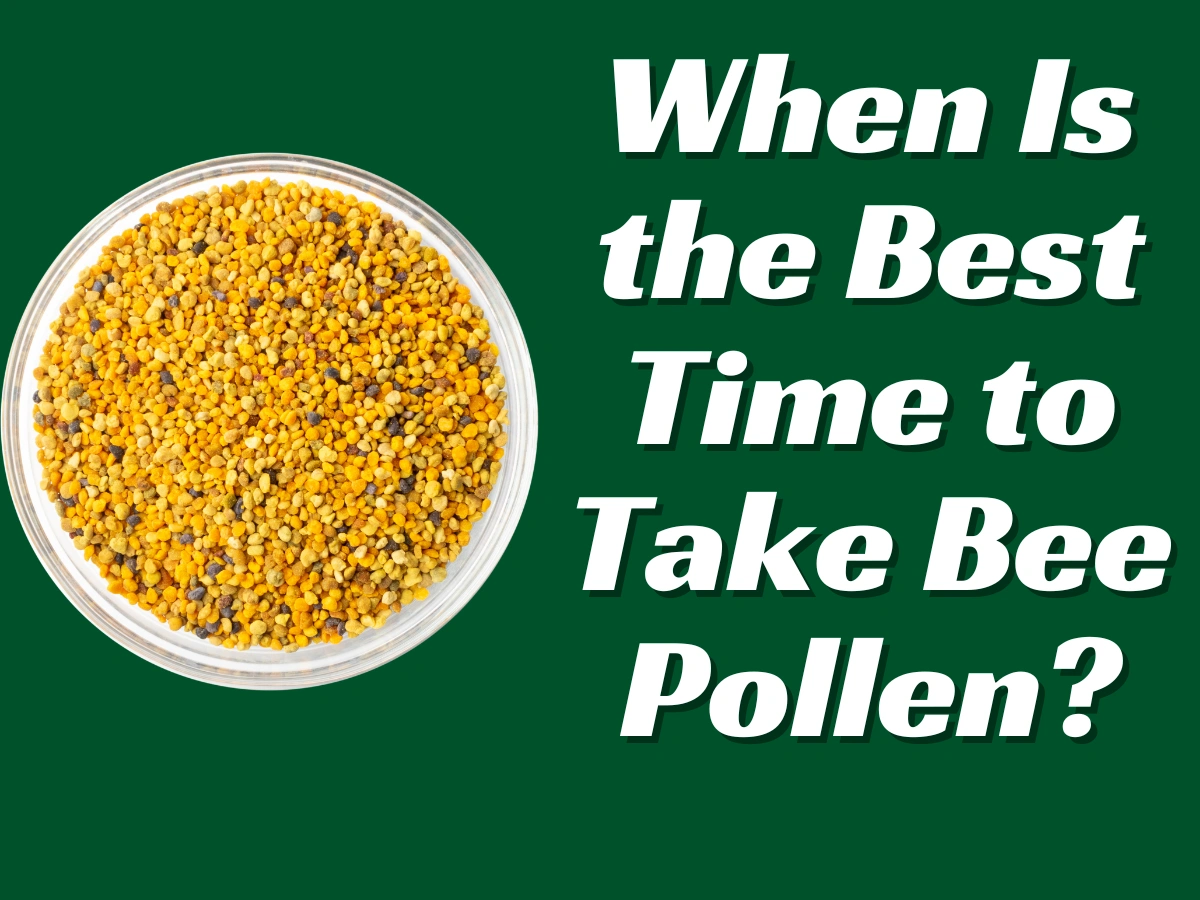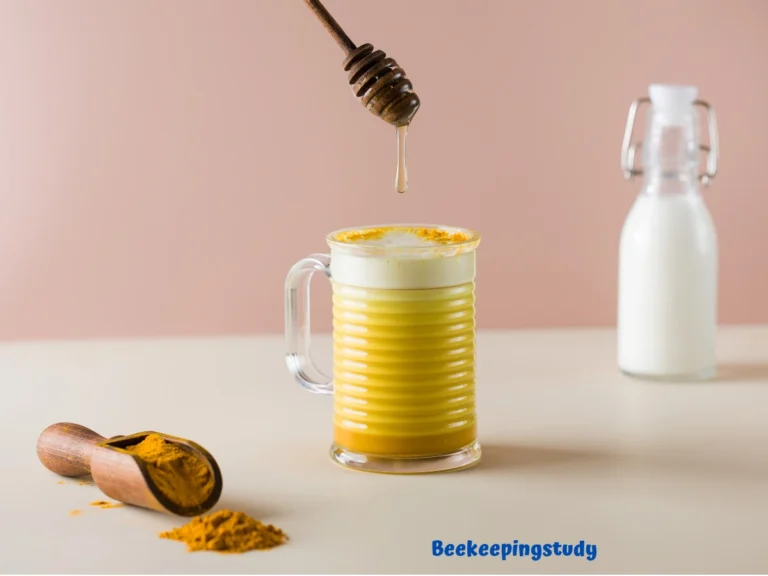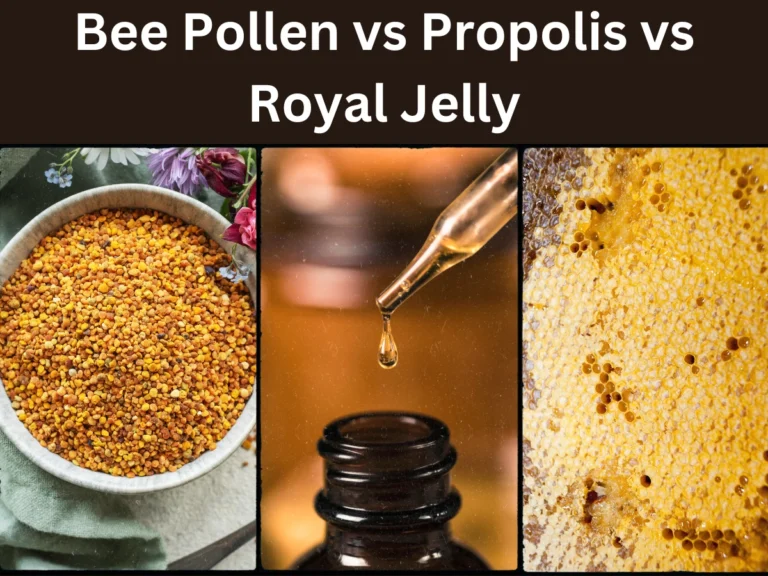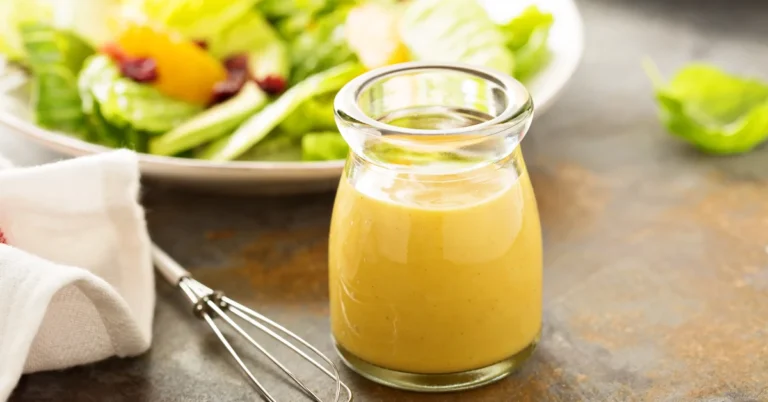This post might be created with help from AI tools and carefully reviewed by a human (Anthor Kumar Das). For more on how we use AI on this site, check out our Editorial Policy.
When Is the Best Time to Take Bee Pollen for Best Results
Many people ask, “When is the best time to take bee pollen?“. I asked the same question when I started. I tried it at night, then in the morning. The results felt very different.
In this guide, I will share what actually worked for me. You will learn the best time of day, simple ways to take bee pollen, daily dosage, and safety tips.
I will keep things clear and practical. So you can build a routine that fits your daily life.
Bee pollen is popular for steady energy, skin support, and hormone balance. But timing and method matter. Small changes in your routine can change your results a lot. Let’s get this right from day one.
What Is Bee Pollen and Why It Matters
Bee pollen is a mix of flower pollen, nectar, and enzymes that bees carry home. Bee pollen tastes different than honey and royal jelly. It is a natural food with many small nutrients packed inside.
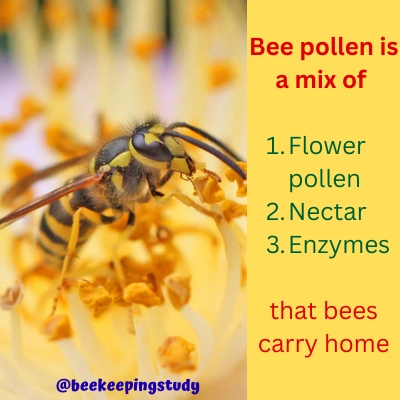
Bee pollen has a lot of benefits for women and men of all ages. The following are the major healthy compounds present in bee pollen.
- Protein and amino acids for daily energy and repair.
- Vitamins and minerals that support skin, hair, and mood.
- Antioxidants that help fight everyday stress on the body.
- Enzymes that can aid gentle digestion when used with food.
Why Does it Matter to You?
Different people take bee pollen for different purposes. So, it widely depends on which purpose you want to take it. Based on the primary goal, the perfect timing of taking bee pollen can vary.
- You can use it as a simple daily boost without heavy stimulants.
- It may help with focus in the morning and steady energy through the day.
- People often use bee pollen to get healthy hair.
- With the right timing it can support workouts and recovery.
- Many people also take bee pollen for skin glow and general wellness.
Fresh, raw bee pollen works best for most people. Bee pollen benefits males and females of almost all ages due to its rich nutritional components.
Store it in the fridge to keep its quality. Start small, listen to your body, and build a routine that you can follow every day.
Why Right Timing for Consuming Bee Pollen Is Important
Timing affects how bee pollen feels in your body. Take it at the right hour, and you get steady energy and better focus. Take it at the wrong hour and you may feel restless or notice no real benefit.
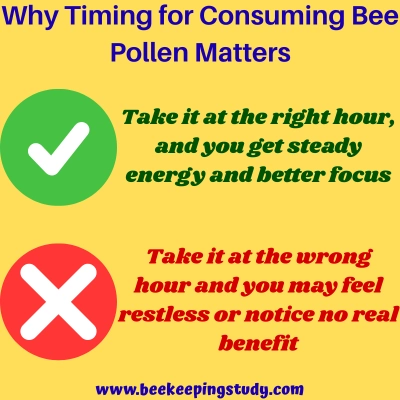
Your goals matter too. Morning timing helps with daily energy. Pre-workout timing helps with stamina. Late night timing can disturb sleep.
A simple routine at the same time each day gives the most benefits of consuming bee pollen.
Misuse of Bee Pollen
Many people do not get results because they use bee pollen the wrong way. Here are common mistakes and why they hurt results.
- Taking it late at night: Can raise alertness and make it hard to sleep.
- Starting with a large dose: May cause stomach upset or mild reactions. Start small.
- Taking it on an empty stomach on day one: Some feel nausea. Pair with yogurt or a smoothie at first.
- Using it only once in a while: Inconsistent use leads to weak results. Daily use works better.
- Mixing with very hot drinks: Heat can reduce enzymes and sensitive nutrients.
- Combining with too much caffeine: Can cause jitters in sensitive people.
- Skipping an allergy test: If you have pollen allergies, test a tiny amount first.
- Poor storage: Leaving it at room temp for weeks lowers quality. Bee pollen doesn’t have a shelf life, but it’s quality can degrade if doesn’t stored properly. Keep it in the fridge.
The fix is simple. Use a small dose in the morning with food for a week. If you feel good, increase slowly.
Keep the same time each day. Adjust timing around workouts if needed. Avoid late night use.
When Is the Best Time to Take Bee Pollen
Taking bee pollen at the wrong time may not help you achieve your goal. This is why choosing the ideal timing is crucial to get the maximum potential from it.
So, when is the best time to take bee pollen? The best time to take bee pollen depends on what you want from it. Generally, taking bee pollen in the morning is ideal for most goals. Some people take it for energy. Some take it for skin, fitness, or general balance. Each goal can have a slightly different ideal timing.
Below are the most common times of the day that work best for different needs.
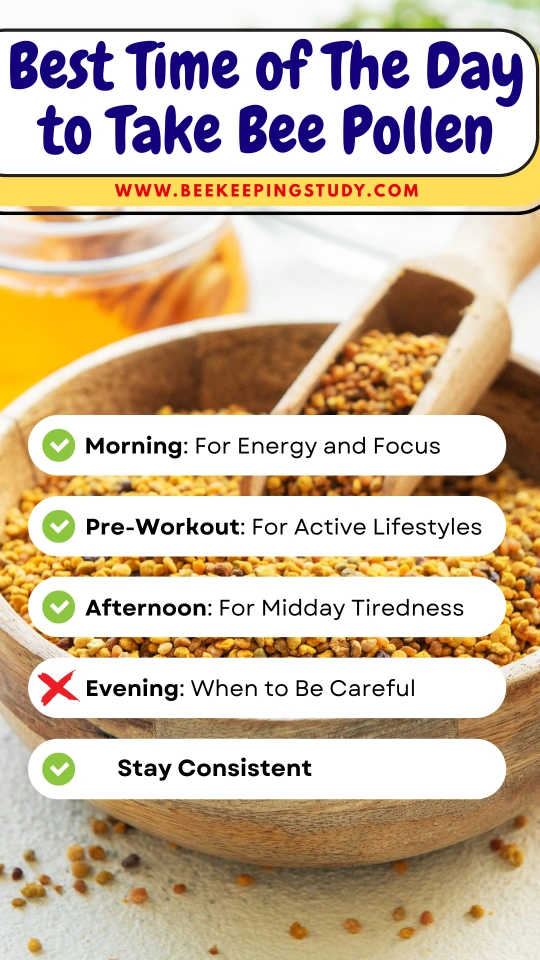
Morning: For Energy and Focus
Morning is the best time for most people. A small spoon of bee pollen before or during breakfast helps boost energy naturally. It supports metabolism, focus, and steady mood throughout the day.
Many people on beekeeping and health forums say morning use gives them clearer thinking and less fatigue. I noticed the same when I started adding bee pollen to my breakfast smoothie. It works like a slow, natural energy source without caffeine.
Mid-Morning or Pre-Workout: For Active Lifestyles
If you are physically active or go to the gym, take bee pollen about 30 to 45 minutes before workout. It provides nutrients that support muscle function and stamina. You can mix it with banana, honey, or a light snack.
For outdoor workers or busy professionals, a mid-morning dose helps avoid the energy dip that often comes after long early hours. It keeps focus high until lunch.
Afternoon: For Midday Tiredness
Taking bee pollen with lunch or early afternoon can help if you feel sluggish during the day. It provides gentle energy without overstimulating the body. Mix it in fruit juice or yogurt for a natural refresh.
Note: Avoid taking bee pollen too late in the afternoon if you are sensitive to energy spikes. Some people notice mild alertness that can make evening rest harder.
Evening: When to Be Careful
Evening is usually not the right time to take bee pollen. It can make you feel more awake and delay sleep. A few users take a very small amount with honey for skin or hormone support, but that is rare and should be done carefully.
If you want to try it at night, keep the dose minimal and observe how your body reacts. If you notice any sleep disturbance, move your dose back to morning or midday.
Seasonal or Goal-Based Timing
During busy or stressful months, taking bee pollen in the morning and again before noon can support recovery and focus. For beauty or hormone balance, consistent morning use is still the best choice. For fitness goals, pre-workout timing gives better results.
Whatever your purpose, keep your schedule steady. Regular use at the same time every day helps your body adapt and use the nutrients more effectively.
What People Say About Bee Pollen Timing
Different people experience bee pollen differently, and most of what we learn comes from shared experiences. I’ve read and talked with many beekeepers and natural health enthusiasts online, and the feedback is very consistent.
- Morning use gives the best energy: Many people say taking bee pollen in the morning keeps them active and focused all day. Some even replace coffee with a teaspoon of bee pollen mixed in warm water or smoothies.
- Pre-workout timing helps performance: Athletes and outdoor workers often take it 30 to 45 minutes before exercise. They report better stamina and faster recovery afterward.
- Midday use works for busy schedules: A few users prefer it with lunch or just after for a gentle energy lift. It helps them avoid that sleepy feeling in the afternoon.
- Evening timing can disturb sleep: Many noticed that taking bee pollen too late in the day made them feel too awake at bedtime. This is why most recommend using it earlier.
From my own experience, morning timing feels the most natural. It sets the right rhythm for the day and works well with other healthy habits like breakfast or light exercise. The key is to find your best time and stick with it regularly for steady results.
How to Take Bee Pollen Properly
There is no single rule for taking bee pollen. The right way depends on your body, lifestyle, and goals.
Below are some simple and safe methods that work for most people. They will help you get the best results without any side effects.
Start Slow and Test Your Body
If this is your first time taking bee pollen, start small. Take only about ¼ teaspoon per day. This small amount helps your body adjust and lets you see if there is any reaction or allergy. Most people handle it well, but it is better to be careful in the beginning.
After a few days, if you feel good, slowly increase your intake up to 1 teaspoon daily.
Always listen to your body. If you feel bloated or uneasy, lower the dose for a few days and try again later.
At the start, avoid taking bee pollen on an empty stomach. Mix it with food like yogurt or a smoothie.
You can use bee pollen in tea in the morning as well. This helps with gentle digestion and better nutrient absorption.
Easy Ways to Add Bee Pollen to Your Diet
You can take bee pollen in many simple and tasty ways. Choose the one that fits your daily routine.
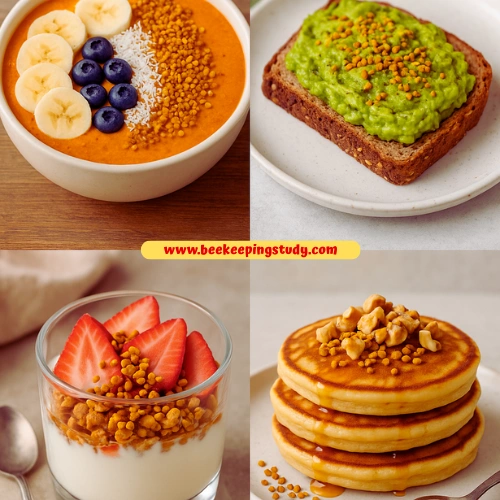
- Sprinkle it on yogurt, oatmeal, or fresh fruit.
- Add it to smoothies, milkshakes, or honey-lemon drinks.
- Blend it with raw honey to make a “bee pollen spread” that you can take with bread or crackers.
- Mix a small amount into salad dressings or juice if you prefer a lighter option.
- You can use bee pollen in several recipes or even taking as raw.
Consistency matters more than quantity. Taking a small amount daily gives better results than taking a large amount once in a while.
How Long to Take Bee Pollen for Results
Bee pollen works gradually. You may start feeling better energy and mood within 1 to 2 weeks of regular use. Skin, hair, and hormone benefits usually take a bit longer, about 1 to 2 months.
Keep your routine steady and be patient. Natural products take time to show visible results, but they support long-term health gently and safely. Once you see changes, continue your daily use for stable benefits.
Recommended Bee Pollen Dosage
Bee pollen is very nutrient-dense, so you do not need a large amount to enjoy its benefits. The right dosage depends on your age, activity level, and health goals. Start small and increase slowly to find your comfort level.
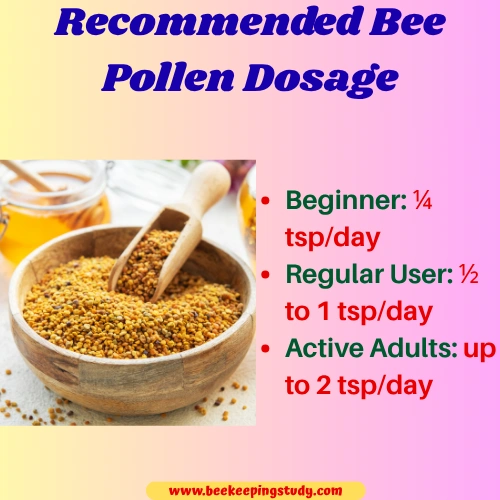
- Beginners: Start with ¼ teaspoon daily for the first 3 to 5 days to see how your body reacts.
- Regular users: Once you feel comfortable, increase to ½ to 1 teaspoon per day.
- Active adults or athletes: Up to 1 to 2 teaspoons before breakfast or before workouts for extra energy.
Note: High intake of bee pollen can have some side effects in some people. This is why I prefer not to consume more than 1 spoon of bee pollen in each day. If you don’t see any side effects than you may gradually increase the dose to maximum of 2 teaspoons per day.
It is always better to take bee pollen daily in small portions than to take a large amount at once. Your body absorbs nutrients more effectively this way.
You can divide your daily dose into two parts, one in the morning and one before lunch, if you have a long and active day.
Tips for Better Results
Bee pollen gives the best results when you use it correctly and regularly. A few small habits can make a big difference in how your body responds to it.
- Take it with food: Mix it with yogurt, honey, or smoothies for easy digestion.
- Stay consistent: Daily use gives steady results over time. Skipping days slows progress.
- Store it right: Keep bee pollen in the fridge to protect its enzymes and nutrients.
- Stay hydrated: Drink enough water during the day to help your body process nutrients better.
- Buy from trusted sources: Choose fresh, raw bee pollen from local beekeepers or verified brands.
- Combine with honey or royal jelly: For extra benefits, you can take it with raw honey or royal jelly to boost overall vitality.
Remember, bee pollen is not a quick fix. It is a gentle, natural food that helps balance your energy and health when taken regularly with proper care.
Precautions and Allergies
Bee pollen is safe for most people, but it can cause mild to serious allergic reactions in some. Always start with a small amount to test your body’s response.
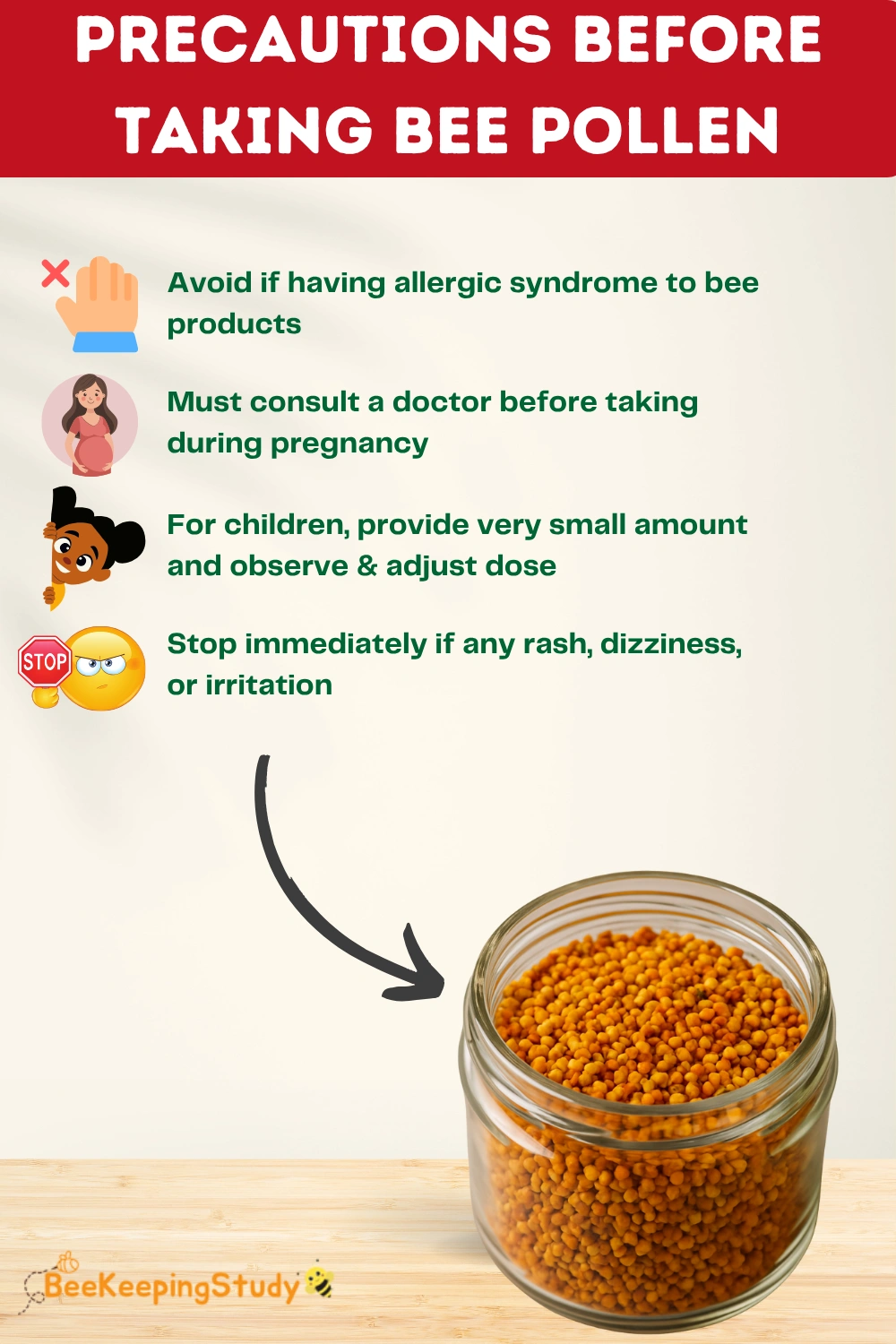
- Allergy alert: Avoid bee pollen if you have known pollen or bee product allergies. Reactions can include itching, swelling, or difficulty breathing.
- Pregnant or breastfeeding women: Should consult a healthcare provider before using bee pollen during pregnancy.
- Medication interaction: If you are taking blood thinners, allergy medications, or supplements, talk to your doctor before adding bee pollen.
- Children and elderly: Give only under supervision and start with very small amounts.
- Stop immediately: If you notice any rash, dizziness, or throat irritation, stop taking it and seek medical advice.
Bee pollen can be a wonderful natural supplement if used correctly. Just remember that safety and consistency matter as much as timing and dosage.
Frequently Asked Questions
It is better not to take bee pollen on an empty stomach, especially when you are just starting. Mixing it with food like yogurt or smoothies helps your body digest it more easily. Once your body adjusts, you can try taking it before meals if it feels comfortable. Bee pollen is more energizing than relaxing, so taking it at night may make it harder to sleep. For skin benefits, it is not about timing but consistency. Daily morning use works best because your body can process nutrients throughout the day. Bee pollen nutrients begin working soon after digestion and stay active for several hours. Vitamins and antioxidants are absorbed within the first few hours, while proteins and minerals can support the body for the rest of the day. That is why morning or mid-morning use keeps energy steady all day. Yes, you can take bee pollen every day as part of your normal diet. Just start small and be consistent. A small daily amount is safer and more effective than taking large doses occasionally. It helps your body build a natural balance over time. Bee pollen can be safe for both teenagers and older adults when used carefully. Start with a very small amount to test for any allergic reaction. Teenagers can benefit from its vitamins and protein, while older adults may find it supports energy and immunity. Always consult a doctor if you have allergies or ongoing medical conditions.Should bee pollen be taken on an empty stomach?
Can I take bee pollen at night for sleep or skin?
How long does bee pollen stay in the system?
Can bee pollen be taken every day?
Is bee pollen safe for teenagers and older adults?

